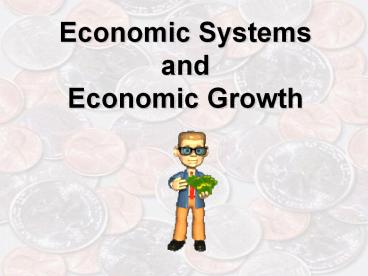Economic%20Systems%20and%20Economic%20Growth - PowerPoint PPT Presentation
Title: Economic%20Systems%20and%20Economic%20Growth
1
Economic SystemsandEconomic Growth
2
Economy
- The production, distribution, and use of goods
and services. - There are three main types of economic
- systems
- 1. Traditional
- 2. Command
- 3. Market
3
Traditional
- What and How the goods/services are produced are
based on customs - All goods/services are shared with all members of
the economy - A community that uses a traditional economy
relies on itself for all their needs - Example an economy that hunts and gathers to
survive
4
Command
- The government decides what goods are made and
how they will be made - The government decided who will receive the goods
produced - There is no pure command economy in the world
today - China is still partly command
5
Market
- People are free to exchange good and services
without government involvement or regulations - What is produced, how it is produced, and for
whom it is produced is decided on solely by the
person - There is no pure market economy in the world.
6
Mixed
- Is a mixture of command, and market economies
- The United States has a mixed economy where
individual ownership is encouraged but the
government issues regulations.
Pure Market
Pure Command
7
Gross Domestic Product (GDP) Gross National Product (GNP)
The total amount of goods and service produced IN a country. Per capita GDP is the GDP divided by the countrys population. This figure shows individual purchasing power and is useful in comparing levels of economic development. The value of all goods and services that a country produces in one year. It includes goods and services made by factories owned by the country but located in a foreign country.
8
Economic Growth
- A measure of a nations growth in the output of
goods and services. - Three key things that can affect a countrys
economic status are government systems, political
stability, and trade barriers - Main factors that influence economic growth are
- Natural resources
- Human resources
- Capital resources
- Entrepreneurship
- Trade with other nations
- .
9
Natural Resources
- Supplied by nature and can be used to develop
wealth for a society - Natural resources are a part of a nations GDP
- Naturals resources influences a nations status
in the world - The more natural resources a country has, the
more economically developed the nation is.
10
Human Resources
- People are needed to make industry work
- Human Capital the value that people bring to
the marketplace
The productivity of an industry can influence the
economy as a whole for the better.
Company invests in human capital through training
and education
Investments in human capital can increase
productivity of the company and the industry
- There is a positive correlation between Human
Capital and Income - As a persons education level (human capital)
increase their ability to produce income
increases which has a positive impact on the
countrys GDP.
11
Capital Resources
- Capital goods any goods or equipment used by a
business to produce other goods - In a factory that makes sweatshirts, a capital
good would be the machine that cuts the shirts. - The better and newer the capital goods, the more
a business can grow. - Investing money in new technology (capital goods)
helps businesses. - A countrys willingness to invest in capital
resources can help increase their GDP.
12
Entrepreneurship
- Entrepreneur a person who is willing to take a
risk to create a business to sell a new technique
(way of doing something), idea, or product - These people are seen as business leaders and
innovators trying new things - If a country has an increase number of
entrepreneurs they will increase the countrys
economic growth (GDP)
13
Trade with Other Countries
- Many people today talk about fair trade
- Fair Trade the idea that practices such as
underselling are unfair and should be stopped. - Underselling occurs when a company or industry of
a nation sells products for less that the true
market value in other countries. - This harms the economy (industries and companies)
in the country where the products are exported. - To protect the countries and find a trade balance
(when imports and exports are at a fairly equal
level), trade barriers have been put into place
in several countries.
14
Trade Barriers
- Trade Barriers - economic or physical limits to
what can be sold within a country. - There are three main types of trade barriers
Tariff Quota Embargo
A tax placed on goods that are brought into a country A limit on the quantity of goods and services that can be imported A ban on trade with a country for political reasons.
Remember Tax Tariff Remember Quota Quantity (limit) Remember Embargo - Ban































